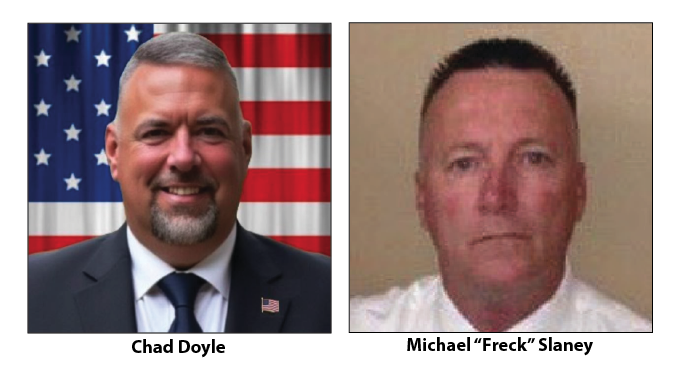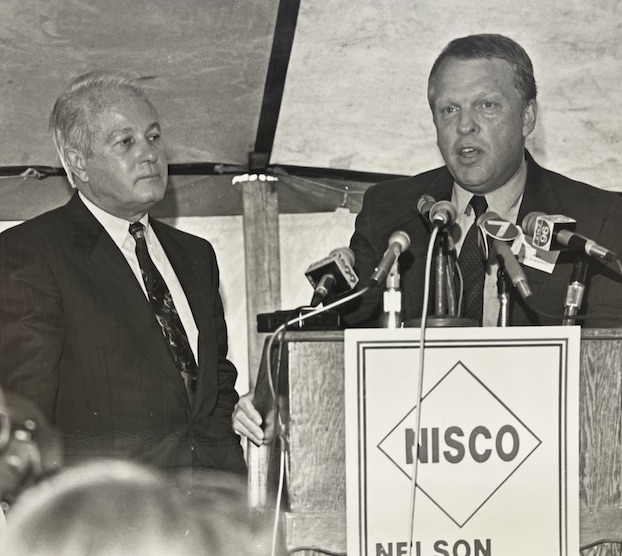Drug Treatment Court: Offenders offered path to recovery through accountability
Published 6:54 am Sunday, April 6, 2025

- 14th Judicial District Court Judge David Ritchie speaks Tuesday to members of Kiwanis Lake Charles at the Charleston Hotel on downtown Ryan Street. (Crystal Stevenson / American Press)
For nearly two decades, there has been a movement in Calcasieu Parish to transform the way the justice system responds to substance use and mental health disorders. Rather than continuing the revolving door of addiction and related crime, treatment courts break the cycle by holding individuals accountable while connecting them with the treatment and support needed to change their lives.
The 14th Judicial District Court offers an Adult Drug Treatment Court designed to help non-violent offenders get off of drugs and stay off of them.
“One of my many missions in life is children,” said 14th Judicial District Court Judge David — who co-founded the court in 2007 and presides over its caseload alongside Judge Michael Canaday. “Children are very important to me. The impetus behind wanting to start the drug court has to do with children.”
Trending
After Ritchie was elected to the court in 2003, he was sent to Nevada for a two-week jurisdictional course.
“One of the things we did for a half-day was we went to a drug court there,” he said. “I remember so vividly this lady who was holding a newborn baby during court and the judge asked her — I’ll call her Susan — ‘Susan, how long have you been cleaning houses?’ and she said, ‘I’ve been cleaning houses for nine months, judge, and I feel so good and I never would have dreamed I’d be cleaning for this long and I’m so grateful for this program. I have a drug-free baby now and I’m just so grateful for that.’ It was a non-adversarial conversation. Then the judge stepped down and said, ‘Bring that baby up here,’ so she brought him the baby and he’s grinning and he’s holding the baby and I thought, ‘I want that.’ ”
That was in the summer of 2004. In April of 2007, he would get his wish.
“What I thought at that time was how much I would love to get something like that started in Louisiana,” he said. “I thought it would just be a pipe dream, but a couple months after that I was at a fall judges conference in New Orleans and I saw this guy who worked on the Supreme Court and he was the deputy administrator for drug courts.”
Ritchie said he peppered the man with questions then told him of his desire to start a drug court in Lake Charles.
“The man said, ‘You know, we’ve been wanting to start one in Lake Charles. Are you serious?’ I told him, ‘I’m your guy.’ ”
Trending
While the deputy administrator appreciated Ritchie’s enthusiasm, he wanted to make sure Ritchie was in it for the long haul.
“He said, ‘Hold on, hold on. This isn’t just something you do. We have to make sure you’re serious. If you get this started, it’s going to take more than a minute. There’s a lot involved.’ ”
Ritchie said his first goal was to get the Calcasieu Parish District Attorney on board.
“If the DA doesn’t want someone in drug court, they don’t get in,” Ritchie said. “The DA is the gatekeeper on the front end and the judge is the gatekeeper on the back part.”
Ritchie said when John DeRosier was elected DA, he was 100 percent behind the program.
“It took us about a year to get it off the ground because we had to go to several weeks worth of training and then we had our first court session on the first Tuesday of April 18 years ago,” he said. “Since then, we’ve helped many, many people get their lives back together. Every single day there’s so many children who suffer because their parents are on drugs and that’s one of the things that drove me. I thought, ‘If I can get this started and I can help the parents get away from drugs then I could indirectly help their children.’ ”
Ritchie said once the drug court got off the ground, DeRosier applied and received a grant to begin a DWI court. Following that, a court to help veterans was initiated.
The adult drug court is a four-phase, 18-month treatment program. In the first phase, the offender comes to court every week; in the second phase it’s every two weeks; the third phase is every three weeks and the fourth phase is every four weeks. Every day, however, the person is required to call the office to see if they are on that day’s list for a mandatory drug screening.
“I let them know it’s every day and that includes Christmas, Easter, New Year’s, every single day,” Ritchie said. “They call early in the morning to find out if they are on the drug screen line that day. They will be randomly drug screened three days a week. Having that accountability is what helps people. They have to know that at any time they could be drug screened. We don’t take excuses.”
The court is made up of drug treatment counselors, an officer from the adult probation office, drug testers, public defender, prosecutor and case managers.
Until phase three of the program, the offender is under house arrest.
“It’s for their own good,” Ritchie said. “It’s not about punishment; it’s about keeping you on the right path and making sure you’re not making any bad choices, hanging out somewhere where you shouldn’t be hanging out. We want you far enough along in the program to be able to make better decisions. Drug addiction is a powerful, powerful thing and it changes your brain physiologically.”
He said before the program, offenders are living a life of misery. After, they have re-established relationships with their loved ones.
“I can tell you some stories that’ll make your heart hurt, make you angry, make you feel all kinds of emotions.”
Since the court’s inception, 969 drug-free babies have been born to the special court’s participants. The court has a 6 percent recidivism rate with 94 percent remaining free of new convictions three years after their graduation. Seventeen participants earned their GED.
“These programs have saved many lives and have put numerous families back together again, restoring dignity and hope to those suffering from substance abuse disorders,” he said. “I’m pretty proud of it.”





